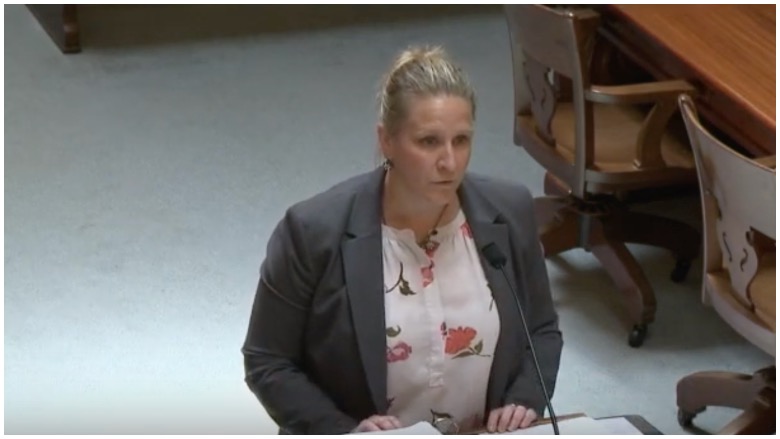
Sarah Fabian from the Department of Justice’s Office of Immigration Litigation is being criticized for her arguments regarding what constitutes safe and sanitary conditions in migrant detention centers, according to social media.
Fabian, 43, argued her case before the three judges on the bench, Wallace Tashima, William Fletcher, and Marsha Berzon, in a courtroom in San Fransisco, California on Tuesday, June 18, 2019.
Here’s what you need to know about Sarah Fabian and why she went viral:
1. Fabian Was Arguing a Case Regarding the Flores Settlement Agreement, Which the Trump Administration Is Trying to End
Fabian appeared in the courtroom to argue a case that stemmed from the Flores Settlement Agreement. You can watch the entire exchange in the clip above. The video, posted by the United States Court of Appeals for the Ninth Circuit, has been viewed over 40,000 times on YouTube.
According to the Center for Immigration Studies, the Flores settlement is an agreement that was signed by the government in 1997 which set immigration detention standards for unaccompanied alien children (UACs), particularly regarding facility conditions and the timing and terms of the UACs’ release.
On Tuesday, Fabian was arguing for the Government, which appealed a 2017 district court ruling that found the feds were in violation of the agreement by failing to provide detained children access to basic toiletries and adequate sleeping conditions.
According to Human Rights First, the Flores Settlement agreement, is “a court settlement, in place for over two decades, that set limits on the length of time and conditions under which children can be incarcerated in immigration detention.” The case began in 1985.
CNN reports, “The agreement was named for Jenny Lisette Flores, a 15-year-old girl from El Salvador. She fled her country in 1985 and tried to enter the United States to be with her aunt. The INS arrested her at the border, and she was placed in a juvenile detention center, where she was handcuffed and strip-searched, according to the Marquette Law Review. The INS refused to grant her aunt custody of Jenny because it wouldn’t release minors to ‘third-party adults,’ the law review article said. The Flores Class Action was filed by the Center for Human Rights and Constitutional Law (lead counsel, then known as the National Center for Immigrant Rights), the National Center for Youth Law and the ACLU Legal Foundation of Southern California, eventually leading to the Flores agreement during the Clinton administration.”
The case was settled in 1997, according to Human Rights First, which says, “After many years of litigation, including an appeal to the United States Supreme Court, the parties reached a settlement in 1997.” According to Human Rights First:
The Flores Settlement Agreement imposed several obligations on the immigration authorities, which fall into three broad categories:
– The government is required to release children from immigration detention without unnecessary delay in order of preference beginning with parents and including other adult relatives as well as licensed programs willing to accept custody.
– With respect to children for whom a suitable placement is not immediately available, the government is obligated to place children in the “least restrictive” setting appropriate to their age and any special needs.
– The government is required to implement standards relating to the care and treatment of children in immigration detention.
The Trump administration has sought to end the Flores Agreement. “In September 2018, the Trump Administration proposed regulations that seek to terminate the Flores Settlement Agreement’s legal safeguards for children, including the provision that children must be transferred to a non-secure, licensed facility within three to five days of apprehension, which has been interpreted to allow for an extension of up to 20 days in times of ’emergency’ or ‘influx.’ The proposed regulations include a number of policies which, if implemented, would allow the government to incarcerate more families for even longer periods of time,” Human Rights First says.
2. The Court Intensely Debated Sleeping Conditions
One topic which was heavily debated in the clip was sleep and sleeping conditions. Fabian seemingly had a hard time defending herself from a barrage of intense questions from the judges.
“You can’t be safe and sanitary as a human being if you can’t sleep,” said Judge Berzon.
Fabian says that she believes sleep is important, but it is on the “more difficult end” of what she was arguing.
“Are you arguing seriously that you do not read the agreement as requiring you to do something other than what I’ve just described?” Judge Fletcher asked. “Cold all night long, lights on all night long, sleep on the concrete, and you got an aluminum foil blanket,” Are you saying that that’s okay under the agreement? I find it inconceivable that the government would say that that is safe and sanitary.”
Attorney Ken White, who is well known on Twitter as @Popehat, wrote a piece for The Atlantic about the backstory that led to Fabian’s arguments during the June 2019 hearing.
“The truth is more complex, but still appalling. The sheer effrontery of the government’s argument may be explained, but not excused, by its long backstory,” White wrote. He explained:
Over the years, lawyers acting on behalf of minors protected by the Flores Agreement have filed numerous motions asking judges to enforce it, claiming that the government has fallen short of its obligations. They filed the motion now at issue in 2016, during the Obama administration, arguing that ICE (Immigration and Customs Enforcement) and CBP (Customs and Border Protection) were violating the Flores Agreement by, among other things, confining minors in facilities that are not “safe and sanitary.”
United States District Judge Dolly Gee, who considered hundreds of declarations from minors and their parents, ultimately ruled that CBP was violating the Flores Agreement. In 2017, during the Trump administration, she found that CBP failed to provide adequate food and water to minors, that it did not maintain the facilities at adequate temperatures, and that it deprived the minors of sleep by confining them on concrete floors under bright lights. Gee also found that CBP’s obligation to provide “safe and sanitary” conditions included providing soap, dry towels, showers, toothbrushes, and dry clothes. Gee ultimately ordered CBP to appoint a monitor to bring its facilities into compliance with the Flores Agreement.
White wrote, “It’s been 35 years since Jenny Flores was strip-searched in an adult facility. Before Sarah Fabian defended concrete floors and bright lights for President Donald Trump, she defended putting kids in solitary confinement for President Barack Obama. The fault lies not with any one administration or politician, but with the culture: the ICE and CBP culture that encourages the abuse, the culture of the legal apologists who defend it, and our culture—a largely indifferent America that hasn’t done a damn thing about it. This stain on America’s soul will not wash out with an election cycle. It will only change when Americans demand that the government treat the least of us as both the law and our values require—and firmly maintain that demand no matter how we feel about the party in power.”
3. Fabian Is an Attorney for the Office of Immigration Litigation & She Previously Gained Attention for Saying Dog-Sitting Duties Would Keep Her Out of Court

Department of JusticeThe seal of the United States Department of Justice.
Sarah Fabian is the senior attorney in the Department of Justice’s Office of Immigration Litigation.
According to the Department of Justice website, The Office of Immigration Litigation, which is divided into two functional sections, an Appellate Section and a District Court Section, “oversees all civil immigration litigation, both affirmative and defensive, and it is responsible for coordinating national immigration matters before the federal district courts and circuit courts of appeals.”
The office provides support and counsel to all federal agencies involved in alien admission, regulation, and removal under U.S. immigration and nationality statutes.
Fabian is a holdover from the Obama administration. It is not clear exactly when she joined the Department of Justice, but she was listed in a 2015 case as being senior litigation counsel in the civil division of the Office of Immigration Litigation in Attorney General Eric Holder’s DOJ.
She has previously taken part in arguments about the Flores decision in 2016, when Attorney General Loretta Lynch was leading the DOJ, and in 2017, when Attorney General Jeff Sessions was in charge.
Fabian was paid $162,673 for her salary in 2018, according to federal government records.
Fabian previously gained attention in July 2018, when she told a federal judge in San Diego that she needed to go to Colorado to be a dog sitter for the weekend and couldn’t be available as arguments were being made about the reunification of children with their families after border separations. An ACLU attorney, arguing for the families, told the judge, “We will do whatever. We will stay the weekend.”
Fabian replied, “I have dog-sitting responsibilities that require me to go back to Colorado but I will be back Monday.” The hearing was scheduled for Monday as a result.
4. Fabian Attended Amherst University & George Washington Law School & Previously Worked at Kirkland & Ellis LLP, the Law Firm Where William Barr Worked

Sarah Fabian.
According to her now-deleted Linkedin profile, Sarah Fabian previously worked for the high-powered law firm Kirkland & Ellis LLP. Attorney General William Barr and several other top Department of Justice officials have also worked at the firm. She worked a litigation associate in the firm’s DC office.
While at Kirkland & Ellis, Fabian was part of a legal team that successfully defended NL Industries, formerly the National Lead Company, in a lawsuit about whether childhood lead exposure caused permanent brain damage. The jury sided with the lead company and several paint manufacturers.
“After hearing four weeks of evidence and deliberating for about five hours, the jury reached a full defense verdict – determining unanimously that although plaintiff ingested lead as a child, he did not suffer brain damage as a result. The jury also concluded that plaintiff was not injured by the treatment that lowered his blood lead levels,” the Kirland website says. “The trial team was led by Kirkland partners Michael D. Jones, a fellow in the American College of Trial Lawyers, and Jennifer G. Levy. The Kirkland team also included associates Nicole E. Goldstein, Brittany P. Whitesell, Sarah B. Fabian and Savaria B. Harris.”
Attorney Michael Jones said in a statement, “We were able to show through a balanced consideration of all of the evidence and history of the family that a finding for NL and the co-defendants was both the right and legal thing to do.”
Fabian is a Massachusetts native and now lives in Colorado. She graduated from Dover-Sherborn High School. She then attended Amherst College, also in Massachusetts, graduating in 1998 with a degree in religious studies, before attending law school at The George Washington University Law School in Washington D.C., graduating in 2004.
Fabian was a law clerk for the Honorable Charles “Chip” Erdmann on the U.S. Court of Appeals for the Armed Forces from 2004 to 2006.
On June 21, a day before her name was trending on Twitter, Fabian posted a quote on her Facebook page from Senator Mitch McConnell about Senator Elizabeth Warren, “She was warned. She was given an explanation. Nevertheless, she persisted.”
5. People Are Reacting to the Exchange on Social Media With Outrage Against Fabian
CEO and founder of Starfish Media Group Soledad O’Brien wonders what kind of human would make such arguments.
Journalist Shaun King called Fabian a white supremacist, adding that he has seen her name in “dozens of reports over the past year arguing against basic human rights for kids.”
Writer and comedian Nick Jack Pappas asks, “When did we reach a point in this country that our jobs became more important than our morality?”
Editor Marcus Baram encourages his followers to contact Fabian and express their opinions.
Attorney Scott Hechinger thinks Fabian should be disbarred.